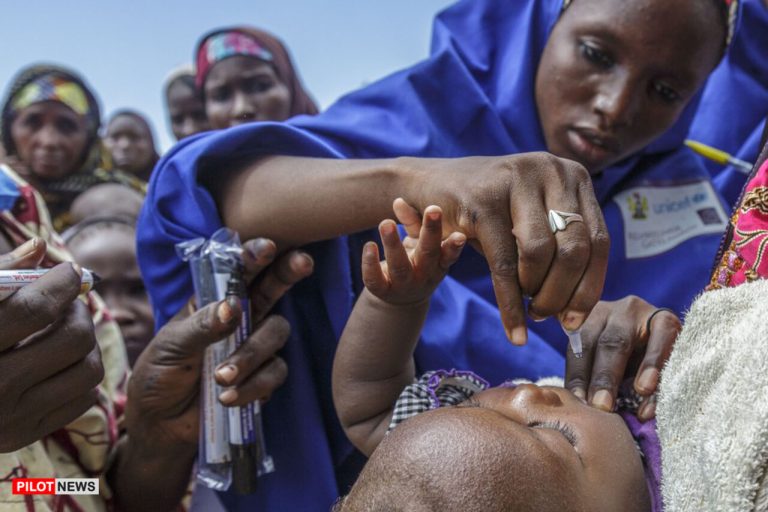The World Health Organisation (WHO), has called for urgent action to fully eradicate polio in Nigeria, in spite of the significant 58 per cent reduction in poliovirus type 2 cases between 2023 and 2024.
The WHO Representative in Nigeria, Dr Walter Kazadi Mulombo, made this statement on Thursday in Abuja during the commemoration of the 2024 World Polio Day.
World Polio Day is held annually on Oct. 24, to raise awareness and resources for the global efforts to eradicate polio.
Mulombo urged community leaders and health workers to intensify efforts towards achieving the 80 per cent reduction target set for December.
While praising Nigeria’s progress in combating polio, he expressed concern over the country’s inability to meet the full reduction target due to ongoing challenges, including vaccine hesitancy, regional conflicts, and logistical barriers in reaching remote areas.
“We have made great strides in reducing the spread of poliovirus type 2, but the job is not done yet.
“The only obstacle now is ensuring every child is vaccinated. We must accelerate efforts to close the gap and protect those still at risk,” he said.
He also warned of the risks posed by the continued spread of circulating poliovirus type 2, especially in conflict-ridden regions like Gaza, Sudan, and Yemen.
“As long as polio exists anywhere, all countries remain at risk,” he added.
He stressed the need for global solidarity and sustained efforts to stop outbreaks.
“Nigeria was lauded for its pivotal role in helping Africa achieve wild poliovirus-free status, a milestone certified by WHO in 2020.
“However, the emergence of variant polioviruses continues to challenge eradication efforts,” he said.
He reiterated WHO’s commitment to supporting Nigeria’s polio reduction goals in collaboration with the Global Polio Eradication Initiative (GPEI) and other partners.
He also called on community, religious, and traditional leaders, to play a more active role in encouraging vaccinations in hard-to-reach areas, emphasising that community engagement was key to ending polio.
“We must not lose sight of what is at stake. It is not just about reaching targets; it is about protecting future generations from a preventable disease,” Mulombo said.
UNICEF’s Health Manager for Immunisation, Dr Shaikh Kabir, acknowledged the bravery and sacrifices of vaccinators, health workers, and mobilisers, who had been attacked, killed, or abducted in the line of duty.
“Their sacrifices have been foundational to the progress made in eradicating polio, and it is essential to honour their memory by continuing the fight,” Kabir said.
He also stressed that polio vaccination alone was not enough.
“To eradicate polio and other preventable diseases, there must be a focus on strengthening routine immunisation coverage and improving the overall health system.
“A comprehensive approach is crucial to long-term success,” he said.
He noted that with 23 million children in Nigeria missing routine vaccinations, there was an urgent need to address the gap.
“Strengthening routine immunisation is key to preventing not just polio, but other diseases that threaten children’s health,” he added.
He disclosed that UNICEF was also working with celebrities to raise awareness and encourage action through initiatives like the “No More Zeros” campaign.
He said that a song released today served as a reminder of the importance of reaching zero cases of polio, and ensuring all children received necessary vaccinations.
He called for continued commitment and collaboration, to ensure every child was vaccinated, emphasizing that this was the only way to achieve a polio-free Africa.
He expressed hope and confidence that through collective efforts, a brighter future for every child could be secured.
Despite significant efforts, the continued spread of circulating variant poliovirus type 2 was primarily fueled by insecurity, restricted healthcare access, and heightened population mobility in certain regions.
In 2023, no less than 83 cases of circulating vaccine-derived poliovirus type 2 (cVDPV2) were reported across Nigeria, with 14 in Kebbi, five in Nasarawa, and three each in Kaduna, Jigawa, and Kano.
Other cases were reported in Borno, Bauchi, Katsina, Kwara, Sokoto, Taraba, and Zamfara.
In 2021, there were 224 cases reported, compared with eight cases in 2020. However, the number of positive cVDPV2 environmental samples was not mentioned.
NAN


